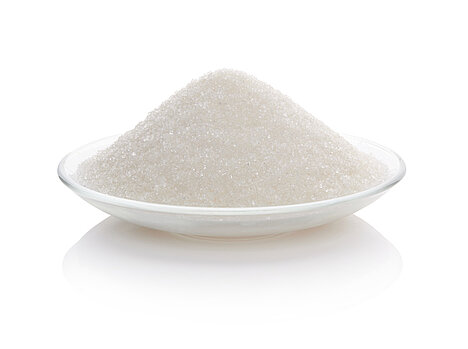Sucrose

But how do dogs tolerate sucrose? Is it harmful or even toxic to them? In this article, you can find out more about the effects of sucrose on dogs and how you can offer your four-legged friend a healthy diet.
Is sucrose toxic to dogs?
Sucrose itself is not toxic to dogs, but it can lead to various health problems if fed in excessive quantities. These include:
- Tooth decay: sucrose encourages the growth of bacteria in the mouth, which can attack tooth enamel and cause holes in the teeth. This can lead to pain, inflammation and tooth loss.
- Obesity: Sucrose provides many calories, but no important nutrients such as vitamins or minerals. If dogs consume too much sucrose, this can lead to weight gain, which in turn increases the risk of diabetes, cardiovascular disease or joint problems.
- Diabetes: Sucrose increases blood sugar levels in the body, which stimulates the pancreas to release more insulin. Insulin is a hormone that regulates blood sugar. If dogs constantly eat too much sucrose, the pancreas can become overwhelmed and no longer produce enough insulin. This leads to diabetes, a metabolic disorder that can be life-threatening.
How much sucrose can dogs eat?
There is no precise indication of how much sucrose dogs are allowed to eat, but the general rule is: the less, the better. Sugar is not part of a species-appropriate diet for dogs and should only be given as a treat in exceptional cases. You should make sure that your dog does not get more than 10 percent of its daily calorie intake from sugar.
To prevent your dog from eating too much sucrose, you should follow these tips:
- Feed your dog high-quality dog food with no added sugar: Many ready-made foods contain hidden sugar to improve the taste or extend the shelf life. Therefore, pay attention to the ingredients list and choose a food that does not contain sugar or other sweeteners such as honey, molasses or syrup.
- Avoid giving your dog human food: Many foods that we humans like to eat are unsuitable or even harmful for dogs. These include chocolate, cakes, cookies and ice cream, for example. These not only contain a lot of sugar, but also other ingredients such as caffeine or theobromine, which are toxic to dogs.
- Watch out for sugar substitutes: Some sweeteners are even more dangerous for dogs than sugar. These include xylitol, for example, an artificial sweetener found in many sugar-free products such as chewing gum or toothpaste. Xylitol can lead to life-threatening hypoglycemia and liver failure in dogs. Therefore, avoid any contact of your dog with products containing xylitol.
Sucrose is not toxic to dogs, but it's not healthy either. Too much sugar can lead to tooth decay, obesity and diabetes, which can affect your dog's quality and expectancy of life. So make sure you feed your dog little or no sugar and choose a high-quality dog food with no added sugar.
If you notice any signs of hypersensitivity or poisoning in your dog, you should see your vet immediately. We are not a substitute for a vet, but we try to be as accurate as possible. Every dog reacts differently and we recommend you get a second opinion or consult your vet if in doubt.
Stay healthy and take good care of your four-legged friend!😊